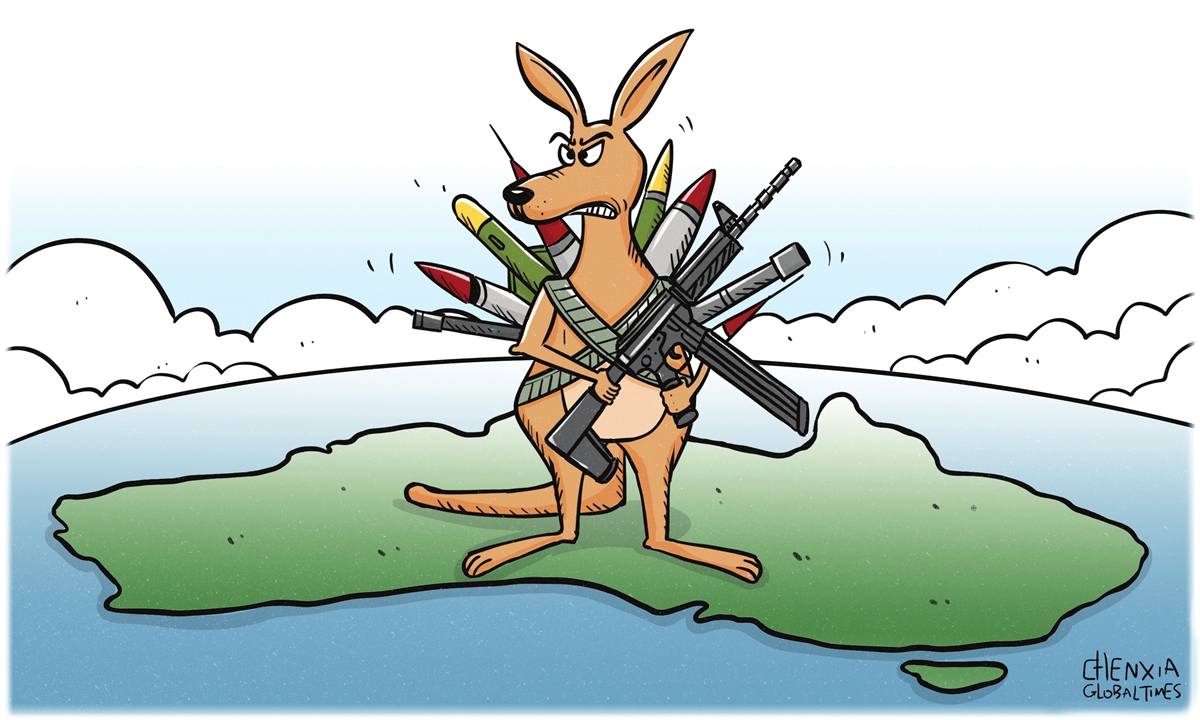Australia’s new budget indicates continuity of risk-taking tendency of previous govt

Illustration: Chen Xia/GT
The Australian Labor Party (ALP) government released its first annual budget on Tuesday since taking office. A newly elected government's budget is often referred to as a "mini-budget," which is often an update, adjustment, or even correction of the previous government's budget for the current fiscal year. However, Australia's new budget shows that the Australian government has inherited the thinking of the previous government in terms of foreign policy and security affairs. Many media outlets call the budget as "seeking to counter China."According to this budget, overall defense spending will increase by 8 percent this financial year. Australia is surrounded by the sea, with the Pacific and Indian oceans providing a natural security barrier. Although Australia's land area is 7.69 million square kilometers, the central part is desert. Australia's total population was 25.93 million in January 2022. Its GDP per capita is in the middle to upper range of the world's economies. Based on this population, economic size, and geographic location, Australia's current defense force is on the high end of the scale.
In most of the period of time since the end of World War II, Australia's defense policy has been guided by "defense," with the Australia-US alliance as the cornerstone of its security strategy. Australia has long sought a geopolitical status, as well as economic development and prosperity, through deep engagement with the US in its regional and global strategies.
However, since 2017, obvious changes have occurred in Australia's foreign strategy and tactics. It has attempted to closely connect with the US Indo-Pacific Strategy, strengthen its participation in the Five Eyes, promote the Quadrilateral Security Dialogue, participate in setting up AUKUS, display an aggressive posture in its policy toward China, and frequently provoke China on issues involving the latter's core interests and sovereignty. At the same time, Australia has started to expand its armed forces and even intends to build at least eight nuclear-powered submarines and increase the number of US troops in Australia.
Australia is no longer satisfied with merely acting as a "pawn" of the US' anti-China strategy, but intends to play the role of a "mini hegemon" in the Pacific region. Through linkage with the US Indo-Pacific Strategy, Australia attempts to impose its regional hegemonic will on the Pacific island countries, exert political and economic influence on Southeast Asia, and at the same time strengthen military cooperation with India, Japan, the EU and other countries and regions.
Former Australian prime minister Scott Morrison spared no effort in cooperating with the US' anti-China strategy and sabotaged the mutually beneficial comprehensive strategic partnership with China. The ALP came into power after winning the federal parliamentary election in May. The international community expects the new government to abandon the Cold War mentality and return to rationality in its China policy.
The new budget shows that the current Australian government will not only continue to increase defense spending, but will also intensify its "competition" with China across the Pacific island countries. Of the new overseas aid package totaling AU$1.4 billion, AU$900 million will go to the Pacific islands. Australian Foreign Minister Penny Wong said last week that "others will continue to fill the vacuum and Australia will continue to lose ground." Under the guise of "aid," what Australia is doing is seeking hegemony. Many believe that what Australia is trying to destroy is the equal and mutually beneficial cooperation between China and Pacific Island countries.
An important feature of Australia's foreign policy is the coexistence of opportunism and adventurism. Driven by right-wing ideology and Cold War mentality, adventurism constantly emerges, and sometimes even dominates the country's foreign and security policy. In the first budget of the Labor government, the risk-taking tendencies of the previous government were not fully corrected in a timely manner, which is obviously contrary to the main theme of peaceful development in today's world.
The author is president of the Chinese Association of Australian Studies and director of the Australian Studies Centre at East China Normal University. opinion@globaltimes.com.cn


